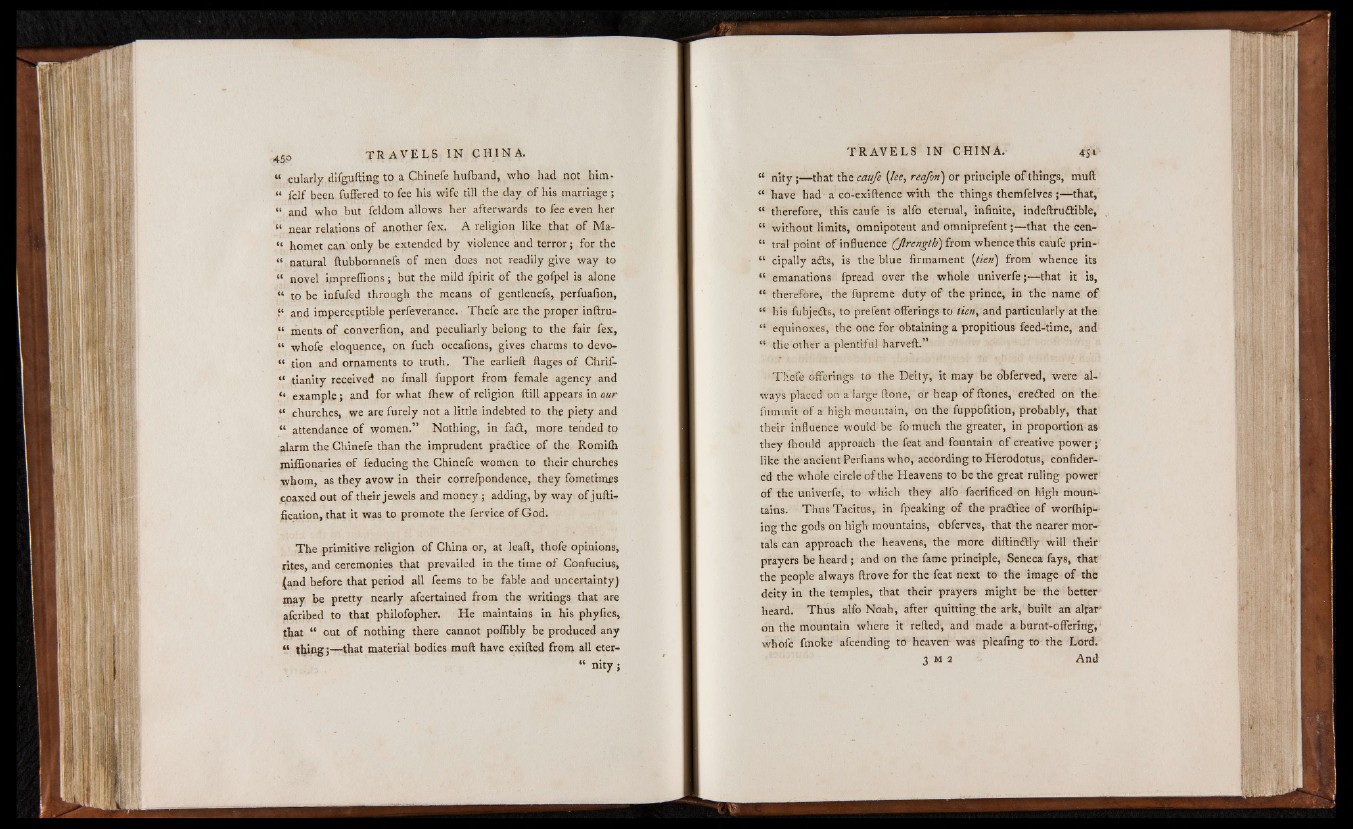
« Cularly difgufting to a Chinefe hulband, who had not him-
“ felf been fuffered to fee his wife till the day o f his marriage ;
“ and who but feldom allows her afterwards to fee even her
“ near relations o f another fex. A religion like that o f Mali
hornet can' only be extended by violence and terror; for the
“ natural ftubbornnefs o f men does not readily give way to
“ novel i,mpreflions; but the mild fpirit o f the gofpel is alone
p to be infufed through the means o f gentlenefs, perfuafion,
f l and imperceptible perfeverance. Thefe are the proper inftru-
“ ments o f converfion, and peculiarly belong to the fair fex,
“ whofe eloquence, on fuch occafions, gives charms to devo-
“ tion and ornaments to truth. The earlieft ftages o f Chrif-
“ tianity received no fmall fupport from female agency and
‘ i example; and for what ihew o f religion flill appears in our
“ churches, we are furely not a little indebted to the piety and
•• attendance o f women.” Nothing, in fad , more tended to
alarm the Chinefe than the imprudent pra&ice o f the Romilh
mifllonaries o f feducing the Chinefe women to their churches
whom, as they avow in their correfpondence, they fometrmes
coaxed out o f their jewels and money ; adding, by way o f jufti-
fication, that it was to promote the fervice o f God.
The primitive religion o f China or, at lead, thofe opinions*
rites, and ceremonies that prevailed in the time o f Confucius,
^and before that period all feems to be fable and uncertainty)
may be pretty nearly afcertained from the writings that are
afcribed to that philofopher. He maintains in his phyfics,
that “ out o f nothing there cannot poffibly be produced any
“ thing;— that material bodies muft have exifted from all eter-
“ n i ty ;
“ nity ;— that the caufe [lee, reafon) or principle o f things, muft
“ have had a co-exiftence with the things themfelves;— that,
“ therefore, this caufe is alfo eternal, infinite, indeftrudlible,
“ without limits, omnipotent and omniprefent;— that the cen-
“ tral point o f influence (Jlrengtb) from whence this caufe prin-
“ cipally a£ts, is the blue firmament [tien) from whence its
“ emanations fpread over the whole u n i v e r f e t h a t it is,
“ therefore, the fupreme duty o f the prince, in the name o f
“ his fubjefits, to prefent offerings to lien, and particularly at the
“ equinoxes, the one for obtaining a propitious feed-time, and
“ the other a plentiful harveft.”
placed on a large ftone, f or heap o f ftones, erected on the
Thefe offerings to the Deity, it may be obferved, were always
fummit o f a high mountain, on the fuppofition, probably, that
their influence would be fo much the greater, in proportion as
they fhould approach the feat and fountain o f creative p owe r;
like the ancient Perfians w ho, according to Herodotus, confider-
ed the whole circle of the Heavens to be the great ruling power
o f the univerfe, to which they alfo facrificed on high mountains.
Thus Tacitus, in fpeaking o f the practice o f worlhip-
ing the gods on high mountains, obferves, that the nearer mortals
can approach the heavens, the more diftinStly will their
prayers be heard; and on the fame principle, Seneca fays, that
the people always ftrove for the feat next to the image o f thfe
deity in the temples, that their prayers might be the better
heard. Thus alfo Noah, after quitting the ark, built an altar-
on the mountain where it refted, and made a burnt-offering,-
whofe fmoke afcending to heaven was pleafing to the Lord.
3 m 2 And